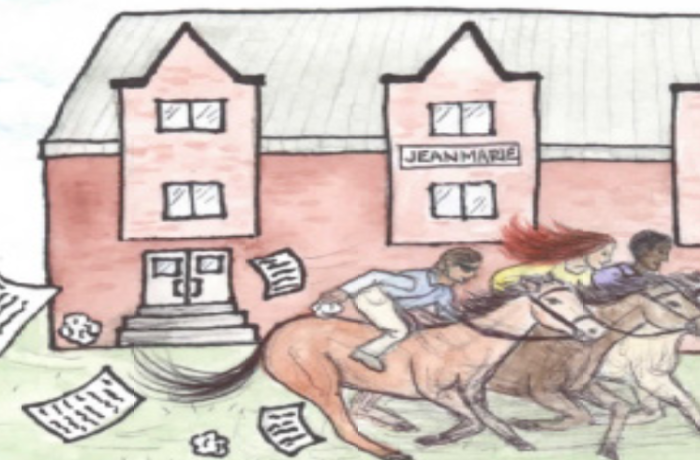
At just nine years old fear began to consume Erick Lattrell. The idea of germs and contamination led him to wash his hands so aggressively they almost bled. However he often found himself in a conundrum because he also feared chemicals that were used for cleaning. “It seemed like it was a no win situation of ‘I feel contaminated’ but at the same time the things that would clean up that contamination would harm me as well,” said Lattrell, now 34 years old.
In recent years Obsessive-Compulsive Disorder has become a popular punchline that’s often used to describe someone who likes things organized and clean. Do a quick search on Instagram and over one million photos of neat rooms and tidy closets pop up, all tagged #OCD.
But for Lattrell, a social worker who practices psychotherapy in Essex Junction, OCD takes on a whole different meaning, “an irrational illogical state of fear, doubt, and guilt that has has tormented him since childhood.
He’s not alone. The National Institute of Health estimates 2.3 percent of adults in the US live with some level of this crippling disorder.
As a child Lattrell spent over an hour everyday checking light switches, power outlets and faucets. If faucets weren’t positioned the right way or items in a room weren’t ordered so the room felt right Latrell could not leave. He would repeatedly check these things until he became so exhausted he was unable to keep checking or until someone else gave him permission to stop.
The belief that something bad would happen if he didn’t perform a particular task fueled his compulsions. “I often didn’t know what the bad thing was, it was just this foreboding sense of something going wrong, or something bad happening to other people said Erick.
“It feels maddening, really, at the time you think you’re going crazy, like why am I thinking these things, why am I thinking these bad things might happen, there’s no logic to it.”
One day during the seventh grade Lattrell was reading an article about a teenager who had OCD who experienced similar things to him like handwashing, fear of germs, and obsessive thoughts and compulsions. “I sat there and I read it, and then I read it again, and I read it again, and I said to myself ‘that’s me.’”
To Lattrell finally having a label for what he had was liberating because it made him realize he was not crazy and that he was just dealing with something. To his surprise when he talked with his mother she told him that he had already been diagnosed with OCD when he was younger.
In highschool OCD led to depression and Lattrell leaned to acting and music to get through. Both activities required active presence. “Active presence is really the enemy of anxiety. You can’t be worrying about the past and projecting on the future if you’re actively in the moment,” said Lattrell.
Therapy also helped Latrell get rid of most of his compulsions but negative thoughts still persisted and became unbearable during his late teens and early 20’s.
During this time happiness became foreign to him, “You get so used to things being off, your new normal is what was abnormal to begin with,” said Lattrell. Lattrell described what he was doing as running away from happiness “I would get back to this more irritable slightly angry state and realize that was more comfortable than feeling good.”
Eventually, Lattrell worked through many of the difficult elements of OCD. He credits three things that allowed him to overcome his intrusive thoughts. He began seeing a therapist he claims was the first person who pushed him to look inward and finally put everything together and realize he was still perpetuating his negative thoughts.
After seeing the therapist Lattrell spent 21 days hiking the Long Trail in Vermont. “Obtaining visceral perspective of meeting the most basic needs of food, water, shelter and sleep helped me realize that things beyond that could be manageable,” Lattrell said. “Everything else is manageable when you get survival out of the way.”
Everything really came together when a memory from Lattrell’s past resurfaced. He remembered being approached by his teacher and principle during a chess tournament in elementary school. They explained to him why he kept losing, “You can see the short game, and you can see a few moves ahead of you but you can’t see the big picture and you’re not seeing the grand strategy of things.” Lattrell described this moment as putting on glasses and finally seeing clearly for the first time.
Latrell stressed that while the hike, the memory, and therapy put perspective together for him everyone has their own experience and overcomes things in their own way. As a social worker who practices psychotherapy, Lattrell stated how rewarding it is helping people overcome their struggles but stressed he is simply a guide. “I’m a sherpa to anybody I work with. I guide them through their own journey, I’m not the one who makes the change I just help them see the things that they might already know about themselves”.
While Lattrell has made significant progress with dealing with his OCD, it will never truly go away. OCD is a manifestation of anxiety which is embedded into the brain “It can be reduced, it can be worked with, you can learn the coping mechanisms, you can learn skills to manage it to reduce the symptomatology, but the likelihood of it going away, I would never promise anyone.”


